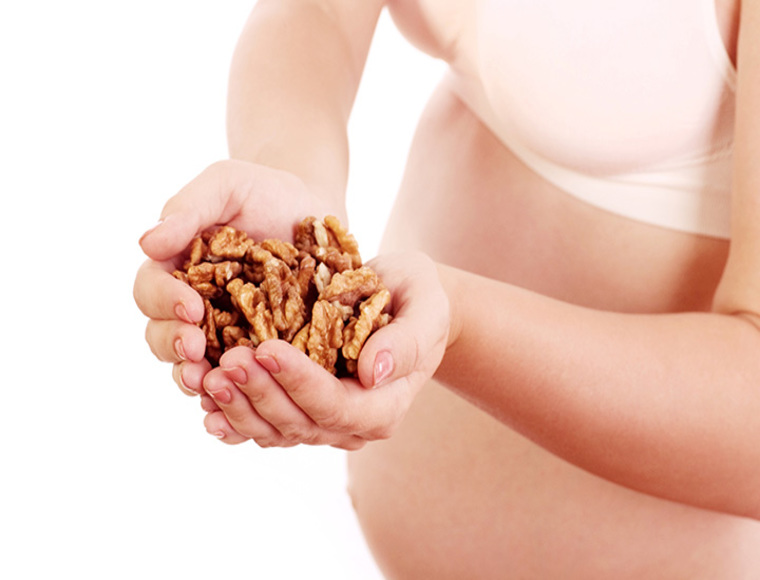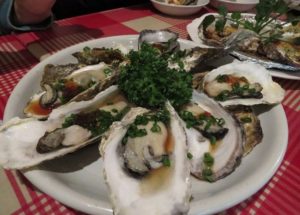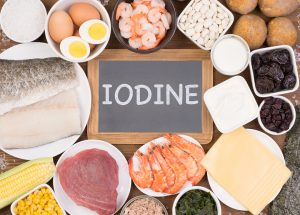Are Walnuts safe during pregnancy?
For most women in pregnancy, it is very important to keep track on what they will be doing and what they are having for meal during their pregnancy. Because there are obviously a lot of precautions that needed to be taken so the baby won’t get harmed.
Walnuts during pregnancy may be one question on your mind.During this time, your body needs additional nutrients, vitamins and minerals.Put simply, choosing healthy, nutritious foods will help ensure the health of you and your baby.It will also make it a lot easier to lose the pregnancy weight after you’ve given birth.
Walnuts
Walnut is the only nut in the genus of Juglans. Scientifically, a walnut is the seed of a drupaceous nut, which makes it not a true botanical nut. Walnuts of a rounded single-seeded stone shaped fruit of the walnut tree. During the ripening process, the shell is hardening and the chaff becomes brittle. The part thus commonly consumed is the flesh of the nut which typically enclosed with a shell.
It is offered in the market in two forms, with and without shell. The most popular species of walnut is English or Persian walnut, with black walnut being the second.
Walnuts during pregnancy
Since your baby is susceptible to everything you expose yourself to, you’ve probably had a lot of questions about what to do and what to eat. Walnuts may have crossed your mind, and we want to give you the right information.
Research states that “Maternal consumption of tree nuts, including walnuts, is associated with reduced nut allergies in offspring.
Is Walnut safe during pregnancy?
It is absolutely safe to consume walnuts during pregnancy, considering that they are super rich in omega-3 fatty acids that contribute to the functioning of the brain and neurological health. They are also an important source of proteins, vitamins, minerals, and antioxidants, all of which are essential for a healthy pregnancy and baby’s development.
Benefits of Walnut during Pregnancy
With an abundance amount of nutritional value in walnut, these benefits below will show you why you should consume walnut during pregnancy. There are 14 health benefits of walnut during pregnancy:
-
A rich source of Omega 3 fatty acid and proteins.
Medical research postulated that eating food containing Omega 3 during pregnancy can help boosting the development of the fetal brain, aiding the retina formation process, while also offer a lot of beneficial growth of the unborn baby’s nervous system.
-
Contains a lot of good fat.
Vegetable fat has been regarded as a good source of fat. While high in fat, walnut offers zero cholesterol, which is an excellent attribute that will help you fulfill your daily fat needs but avoiding gaining cholesterol in the process. In the long term walnut will help lowering blood cholesterol level by providing a healthy amount of HDL level in your blood.
-
A good source of vegetable proteins.
Our body needs proteins. Protein has been known to help restore and building damaged cells. Being good in constructing cells it will aid the cells development of the unborn baby, while also providing a good amount of damage repair to the mother. Vegetable has been noted to be a significantly better source of protein as it offers a safer way of gaining protein. Animal protein being typically bulked with a lot of saturated fats, cholesterol, antibiotics, and hormones.
-
Rich in dietary fibers.
Fibers are commonly known for its attribute in helping your digestion system get rid of your solid waste (feces). Retrospectively, this will save you from possible intestine infection, constipation, and other excretion infection that might follow. Getting digestion problem during pregnancy is highly undesirable, lest adding one.
-
Keeps your stomach full for a longer period of time.
Being high protein and dietary fiber content walnut will keep you much more fuller for a long period of time. This will avoid you from excessive unnecessary binge eating. That will eventually result in less effort in burning off fat after labor.
-
Contains vitamin E.
Vitamin E is a fat-soluble compound that mainly function to give structure to the cells. While you are pregnant, your baby’s cells grow in an astounding rate. Vitamin E will offer cells protection while maintaining the structure of the cells membrane. It is also suggested that vitamin E held an important role in the development of the unborn lungs. It has also been linked to reducing the risk of getting asthma and other respiratory problems later in life.
Vitamin E also delivers the functionality of maintaining a good blood pressure, warding off free radicals, and boosting immune system. You shall consume vitamin E in moderation though as it is not safe to over-consumed vitamin E. The healthy amount of vitamin E is of 3 milligrams per day.
-
Contains polyphenols.
Polyphenols are antioxidant substances which fight the free radicals in your body while also contributing In improving your immune system. Though offers some benefits pregnant mother should be careful in consuming food that contains polyphenols in the third trimester, especially the type that has flavonoids as it is suspected to be the cause of abnormal ductus arteriosus dynamic which can harm the baby. Though, it is believed consuming foods that contains polyphenols can protect the brain cells involved in Parkinson’s disease.
-
Contains manganese.
Other than being another type of antioxidant, manganese has taken an important role during your pregnancy. This mineral function revolves mainly helping the bones and cartilage forming. It also helps protecting the cells from damage. The recommended daily intake for pregnant woman for manganese is 2 milligrams each day.
-
Contains copper.
This minerals are the essential substance in forming red blood cells. During pregnancy, you need double the amount of red blood cells compared to when you are not pregnant so this is a very important mineral to have in your diet. Other than boosting your body’s ability to repair tissues and break down sugars, copper also keeps maintaining the health of your hair.
For the baby, it helps forming the baby’s heart, blood vessels, skeletal and nervous system. Recommended intake per day for pregnant women shall be around 1 milligram and increase it to 1.3 milligram while breastfeeding.
-
Helping with inflammation in the blood vessels.
Eating walnuts regularly can help your body ease the inflammation in the blood vessels, preventing it to break, and helping you to prevent the blood vessels from breaking or weakening. It is very important as blood vessels is the place where your blood flows, the damage or tearing in blood vessels can lead you to loss a handful amount of blood which plays a crucial role in pregnancy. You cannot afford to lose blood as you need it more while you are pregnant, since it carries most of the nutrition you and your unborn needed.
-
Helping women that suffer postpartum depression.
Alternatively referred as “postpartum baby blues”. It is a form of long term depression some new moms experience. This triggers a combination of strong emotions, including mood swings, anxiety, insomnia, and anxiety.
It is typically diagnosed within two to three days prior to labor and can lasts for several weeks. Also, it has been suggested by a lot of medical practitioner to consume walnuts regularly during postpartum depression series as it is believed there are substances in walnuts which helps treating the depression. It is also important to seek for immediate medical attention, involved in a group of new moms, and practicing a healthy lifestyle.
-
The shell of a walnut contains antioxidant.
Unlike chestnut, the shell of a walnut is nontoxic and is biodegradable. Other than having abrasive utility to polish gun casings, jewelry and metal material, it is postulated that the shell of a walnut contains natural antioxidants, called flavonoids.
Though, there are some precaution you need to take as I mentioned above, flavonoid have abundance beneficial biological characteristics, such as anti-bacterial, anti-inflammatory and anticancer (related closely to its being anti-oxidative). It provides healthy nutrients when taken moderately with precaution.
-
Promoted to be one of potential cancer-cure.
Still linked to its shell properties, not only having antioxidant preventing for future cancerous cell development, due to its properties in killing parasites responsible for the disease it is suggested that black walnut can be used or a cure to cancer. It has been listed as one of the 38 substances used to prepare an alternative medicine for cancerous disease called Bach flower remedies.
-
Good nutritional snacks/food for vegan pregnant woman.
If you are not a meat-eating type of person or the kind of individual who is not a fond of animal products, then consuming walnuts during pregnancy might be one of the best nutritious food alternatives for you. It offers a vast variety of nutrition including carbohydrate, fats, protein, vitamins, and mineral. It can act as a rich source of nutrition, which can mostly compensate for what you did not get from the animal products you avoid.
The Risks of Walnuts During Pregnancy
While walnuts have many benefits to mommy and fetus, there are some risks you must be aware of.
- Over-consumption of walnuts can cause diarrhea.
- Walnuts can interfere with iron absorption, which can lead to anemia.
- Even though you may not be allergic to walnuts when you’re not pregnant, you may experience symptoms while pregnant.
- There is a higher chance of hemorrhage during delivery because walnuts can affect the body’s ability to clot blood.
Walnut Allergies
Research has found that women who eat nuts during pregnancy have children who are less likely to have nut allergies. Approximately 1.5% of women who ate less than one serving of nuts every month had children who were at greater risk of allergies.
Walnuts are rich in oil. So if you keep them in room temperature they will easily get spoiled. Therefore always store them in the refrigerator or in airtight containers.
Enjoy this tasty, crunchy nut, in limits (as suggested by doctor), without inhibitions during your pregnancy.
Also read – Importance and side effects of Vitamin C during Pregnancy













